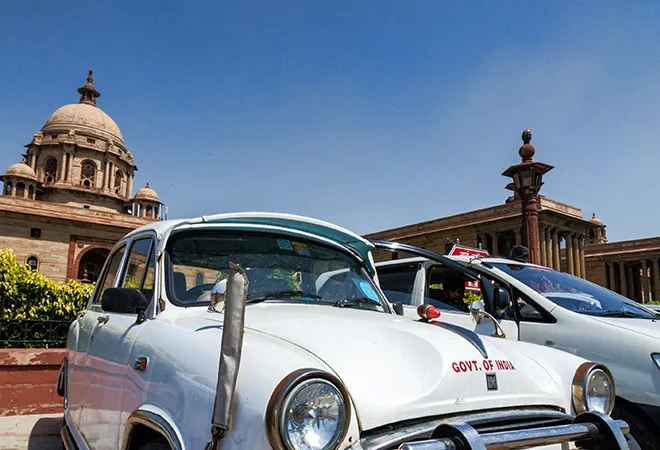-
CENTRES
Progammes & Centres
Location
The law declared “in the public interest” — a term that would get echoed over the next five decades for several laws and policies, to mean the curbing of all economic freedom — that the central government “should take under its control” the industries specified in the First Schedule.

Image Source: Flickr user electro_n1k — CC BY-SA 2.0
The following is a chapter from the book 70 Policies that Shaped India: 1947 to 2017, Independence to $2.5 Trillion.
Find the book here.
India’s infamous Licence Raj began here. Just four years after political independence, the future of the country’s economic independence was sealed with the Industries (Development and Regulation) Act, <1> enacted by Parliament on 31 October 1951. The law declared “in the public interest” — a term that would get echoed over the next five decades for several laws and policies, to mean the curbing of all economic freedom — that the central government “should take under its control” the industries specified in the First Schedule.< 2> The First Schedule included 38 industries, from defence and machine tools to telecommunications and electrical equipment; and 171 articles, from precious metals and coal to fans and sewing machines. The law created a Central Advisory Council <3> to advise the central government “on matters concerning the development and regulation of scheduled industries.” It also prevented the establishment of any new industrial undertaking, unless it was under, and in accordance with, a licence issued in that behalf by the central government. <4> Additionally, it handed the government the power to decide conditions such as where an industry would be located or what its size would be. <5> To set up a small-scale enterprise, for instance, the government would look at six factors <6> before giving a licence: investment in plant and machinery, or land and buildings; nature of ownership; smallness of the number of the workers employed; nature, cost and quality of the product; foreign-exchange requirements for the import of any plant or machinery; and “other relevant factors as may be prescribed.” The other clauses included the power to investigate, <7> to assume management control of an enterprise, <8> and to take over an enterprise without investigation. The prices charged for various products would not be a function of business activity but of the government’s opinion on whether it was equitable. <9> The law delegated immense power to the inspector, who could enter and inspect any premise and examine any document or person. Based on the recommendation by the Law Commission, <10> a 2015 amendment transferred the authority to regulate potable alcohol to states. <11> Finally, in trying to change the geography of economic development, the best the government managed to do was create “company towns”, with little trickle down to neighbouring areas. <12> Its most powerful contribution to the Indian economy, however, was to curb enterprise.
<1> The Industries (Development and Regulation) Act, 1951, Ministry of Law and Justice, Government of India, 31 October 1951.
<2> Ibid., Chapter I, Section 2.
<3> Ibid., Chapter II, Section 5.
<4> Ibid., Chapter III, Section 11 (1).
<5> Ibid., Chapter III, Section 11 (2).
<6> Ibid., Chapter III, Section 11B (1) and Section 11B (2).
<7> Ibid., Chapter III, Section 15A.
<8> Ibid., Chapter IIIA, Sections 18A through 18F.
<9> Ibid., Chapter IIIB, Section 18G (1).
<10> One Hundred Fifty Eighth Report of the Law Commission of India on the Amendment of The Industries (Development and Regulation) Act, 1951, Law Commission of India, 1 June 1998, accessed 29 December 2017.
<11> Amendment in the First Schedule of Industries (Development and Regulation) Act, 1951 to transfer the authority to regulate ‘potable alcohol’ to States, Press Information Bureau, Ministry of Commerce and Industry, Government of India, 9 September 2015, accessed 29 December 2017.
<12> Irvin Roth, “Industrial Location and Indian Government Policy,” Asian Survey (University of California Press) 10, no. 5, (May 1970): 383–396, accessed 29 December 2017.
The views expressed above belong to the author(s). ORF research and analyses now available on Telegram! Click here to access our curated content — blogs, longforms and interviews.

Gautam Chikermane is Vice President at Observer Research Foundation, New Delhi. His areas of research are grand strategy, economics, and foreign policy. He speaks to ...
Read More +